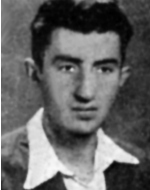Shreiber, Shmuel-Mordechai (Arno)
Son of Yocheved and Moshe-Avraham was born on January 24, 1925, in the town of Tysauilk, Czechoslovakia, where his father had a small farm and the boy grew up in a spirit of love for both the land and the Jewish tradition. In the fourth grade, when the Christian teacher said to pull on his sidelocks, he became a good student, but as a young boy he stood up for his Jewish honor and often collided with his teachers. He took part in many quarrels with the Christian children who insulted him and protected smaller Jewish children when they were attacked. When the Hungarians dispossessed the Jewish farmers from their land, he moved with his family to Budapest, where he worked as a laborer, learned the carpentry work and made a living from it, and at the same time joined the Hashomer Hatzair movement. The Germans invaded Hungary and were sent to a concentration camp in Transylvania, where he managed to escape to the partisans and took part in the Partisan Rebellion in Banska-Bystrica and at the end of the war he arrived with Tysi-Wielk in the hope that he could avenge the murder of his father and mother. There were only two brothers and a sister left alive, who were saved as partisan fighters. The four of them decided to immigrate to Israel. Mordechai crossed the border from the Czech Republic to Germany. He joined Machal (Overseas Volunteers), arrived in Israel with the first group of volunteers, and immediately joined his comrades in the Palmach’s “Paratroopers” (May 1948). Shmuel-Mordechai participated in the battles around Jerusalem, the conquest of Mount Zion, and the preservation of the heroic road. After the liberation of Jerusalem from the siege he was transferred to one of the Harel Brigade battalions and took part in the battles to break the road to the Negev. From the Negev, he managed to write to his sister about his plan to leave immediately after the fighting for settlement with his comrades from the “Porszim” battalion. While carrying out his duties around Ruhama on November 17, 1948, he came upon a mine that exploded. He was taken to a hospital in Be’er Sheva, where he was operated on and died of his wounds. Buried in the wind. On the 16th of Iyar 5706 (16.5.1950), he was transferred to the eternal military cemetery at Mount Herzl in Jerusalem.
